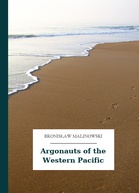Argonauts of the Western Pacific - Bronisław Malinowski (darmowa biblioteka online .TXT) 📖

Argonauts of the Western Pacific to rozprawa naukowa autorstwa Bronisława Malinowskiego. Jest ona efektem wyprawy badacza na wyspy Toulon i wyspy Trobriandzkie.
Malinowski opisuje w niej przede wszystkim rytuał Kula, ukazujący zdolności handlowe ludów tam żyjących. Rytuał polega na wymianie biżuterii, opierającej się na pewnych szytwno ustalonych regułach związanych m.in. z równą wartością wymienianych przedmiotów. Malinowski upatruje w przedstawicielach społeczeństw pierwotnych wcielenia Argonautów z mitologii greckiej, którzy udali się po Złote Runo. Rozprawa Malinowskiego została oparta na wynikach jego metody badań antropologicznych — metody uczestniczącej, a nie wyłącznie obserwacyjnej. Jego działalność była przełomowa dla antropologii, która do tej pory bazowała na prowadzeniu obserwacji, a także rozszerzaniu założeń na kolejne wyniki badań.
Bronisław Malinowski był polskim antropologiem i socjologiem publikującym w pierwszej połowie XIX wieku. Prowadził badania społeczeństw pierwotnych w różnych zakątkach świata.
- Autor: Bronisław Malinowski
- Epoka: Współczesność
- Rodzaj: Epika
Czytasz książkę online - «Argonauts of the Western Pacific - Bronisław Malinowski (darmowa biblioteka online .TXT) 📖». Wszystkie książki tego autora 👉 Bronisław Malinowski
After this digression, let us return to the analysis of our spell. It is a rule that the tapwana, the main part of a formula, is easier to translate, expressed in less archaic and less condensed terms, than the u’ula. The tapwana of this spell has quite easy key-words, both in its first and in its second part. In the first one (phrase 11) the key-words are of mythical nature, referring to localities associated with the flying of one of the Kudayuri sisters. In the second tapwana, the key-word means: „I might heel over” or „I shall heel over”, that is with speed. And this expression stands here for: „I shall overtake”, and the list of words pronounced with this verb denotes the various parts of a canoe. The second part of the tapwana (phrase 14) is much more typical than the first, because the key word is a verb, whilst the list words are nouns. It is typical also, in that the verb expresses, in a simple and direct manner, the magical effect of the spell (the overtaking of the other canoes) whereas the sum of the words of the list gives the object of the spell, that is, the canoe. Such tapwana, in which the magical action is expressed as a verb, while in the list of words we have mentioned the various parts of a garden or of fishing nets, or weapons or parts of the human body, are to be found in all classes of magic.
The first part of the tapwana (phrases 11, 12, and 13) is less typical, in so far that the verbs depicting various magical actions are relegated into the list, while the key-words are adverbial expressions of locality. The verbal links of the long chain express all and one in a metaphoric manner the speed of the canoe. „I shall fly, I shall become like smoke, I shall become invisible, I shall become as a wind eddy”, etc., are all rather picturesque, concrete descriptions of surpassing speed. They present also a linguistic symmetry and singularity. The prefix ba- is the form of the future or potential tense, which I have literally translated „might”, but which stands here for „shall”. The formative prefix yo- is a causative, and stands for „become as” or „become like”. Then follows the root: kokoba- „smoke which trails in clouds above a burning garden”. Hence the expression bayokokoba, in its full concrete meaning, could be translated: „I shall become like clouds of trailing smoke”. Again, boyowaysula in its full meaning could be translated: „I shall become invisible as distant spray”. The only abstract word in this list is tamwa’u, which literally means, „to disappear”. So, in this tapwana, the list consists of a number of formally similar words, each expressing the same general meaning in a concrete metaphorical manner. The length of the whole tapwana (main body) of the spell can be imagined, since in the middle between its two sections the u’ula is recited once more.
The last part of this spell, the dogina, contains an explicit allusion to the Kudayuri myth and to several geographic localities, which are mentioned in that myth. It also shows the usual crescendo, characteristic of the conclusions of a spell. The final results are anticipated in exaggerated, forceful language.
VSo much about the wayugo spell. I shall adduce now another spell of a somewhat different type, belonging to the mwasila (Kula magic). It is distinctly a more modern formula; there are hardly any archaic expressions; words are not used, as independent sentences each; on the whole it is easily understandable and has a consecutive meaning.
Kayikuna sulumwoya (also called Sumgeyyata)A. U’ULA (Initial part)
1 Avayta’u (Who) netata’i (cuts) sulumwoyala (the mint plant of) Laba’i (Laba’i)? Yaygu (I), Kwoyregu (Kwoyregu), sogu (together with) tamagu (my father), katata’i (we cut) sulumwoyala (the mint plant of) Laba’i (Laba’i).
2 Silimwaynunuva (The roaring sulumwoya), inunuva(it roars); silitnwayniku(the quaking sulumwoya), iniku (it quakes); silimwayyega (the soughing sulumwoya), iyega (it soughs); silimwaypolu (the boiling sulumwoya), ipolu (it boils).
B. Tapwana (main part)
3 Ipolu (It boils), ipolu (it boils) ipolu (it boils)... agu sulumwoya (my mint plant) ipolu (it boils); agu (my) vana (herb ornaments), ipolu (it boils); agu (my) kena (lime spatula) ipolu (it boils); agu (my) yaguma (lime pot) ipolu (it boils); agu (my) sinata (comb) ipolu (it boils); agu (my) mo’i (mat) ipolu (it boils); agu (my) pari (presentation goods) ipolu (it boils); agu (my) vataga (big basket) ipolu (it boils); agu (my) kauyo (personal basket) ipolu (it boils); agu (my) lilava (magical bundle) ipolu (it boils).
Dabagu (my head) ipolu (it boils); kabulugu (my nose) ipolu (it boils); kaygadugu (my occiput) ipolu (it boils); mayyegu (my tongue) ipolu (it boils); tabagu (my larynx) ipolu (it boils); kawagu (my speaking organ) ipolu (it boils); wadogu (my mouth) ipolu (it boils); ula (my) woyla (Kula courting) ipolu (it boils).
C. — dogina (Conclusion)
4 Bulumava’u (New spirit) kadagu (my maternal uncle) Mwoyalova (Mwoyalova) kuvapwo (thou breathe) dabana (the spell over) the head (of)) Monikiniki (Monikiniki), kuvapokayma (thou breathe), dabana ((the spell over) the head (of)) agu (my) touto’u (light wood).
5 Avaliwo (I kick) koya (the mountain) — isikila (it tilts over) koya (the mountain); imwaliku (it subsides) koya (the mountain); ikaywa’u (it opens up) koya (the mountain); isabwani (it jubilates) koya (the mountain); itakubile (it topples over), koya (the mountain); itakubilatala (it topples down) koya (the mountain).
6 Avapwoy na (I breathe (a spell over)) dabana (the head (of)) Koyava’u; (Koyava’u); avapokayma (I charm) lopoum (thy inside (of)) Siyaygana (Siyaygana (canoe); akulubeku (I drown) wagana (the waga) akulisonu (I submerge) lumanena (the lamina).
7 Gala (Not) butugu (my renown), butugu (my renown) pilapala (thunder); gala (not) valigu (my treading), valigu (my treading) tumwadudu (noise made by flying witches (? )) tudududu (tudududu).
The opening sentences of the formula are so clear that the translation word for word explains itself without any closer commentary, except of course as far as the names are concerned. Laba’i is a village in the North of Kiriwina, and it plays a considerable part in the mythology of the origin of man, since several of the principal sub-clans emerged there from underground. Laba’i is also the home of the mythical culture-hero Tudava. The mythology of the Kula, however, does not include Laba’i amongst the places, on which it touches. Perhaps this somewhat anomalous features of the formula may be connected with its obvious linguistic modernity? The other personal name mentioned in this spell is Kwoyregu, on which Layseta, who gave me this magic, commented in the following manner:
„A man, he lived in Laba’i, the master of the magic. It was not this man who first knew the magic of Monikiniki. That magic was partly found by Tokosikuna, partly in olden days in Sinaketa”.
In explaining this commentary it must be noted that the informant was a Sinaketan man, hence his local patriotism, for there is no definite, mythological version connecting the early practice of the mwasila with the village of Sinaketa. As we saw, Tokosikuna is indeed one of the mythical heroes with whose story the magic of mwasila is associated. Monikiniki is the name of one of the systems of the mwasila magic, which usually is said to come from a man of that name.
Phrase 2 of this spell contains four couples, each consisting of a compound and a verb. The substantival compounds have all, according to the alliterative symmetry so dear to Kiriwinian magic, the prefix silimway-, derived from sulumwoya, the mint plant. Such play on words, especially on what is the leading word in a spell, as sulumwoya is here, shows that the purely phonetic handling of words must be associated with the idea or feeling of their inherent power. The keyword of the tapwana (phrase 3), has been translated, literally „it boils”. Perhaps it might have been translated in its other slightly different meaning „it foams”. Probably it has both meanings to the mind of the native reciter. I think that the use of a word fraught with two meanings at the same time is one of the characteristics of native language. In this spell, for instance, the word polu appears as one in a series of such verbs as „to roar”, „to quake”, „to sough”, all carrying the meaning of „noise”, „commotion”, „stir”, a meaning which is in harmony with the magical effects to be produced by the mwasila magic. In this context the obvious translation of the word would be: „to foam”. On the other hand, this spell is said over a piece of mint, which will be preserved in boiled coco-nut oil, and the double meaning here contained might be paraphrased in this manner: „as the oil of the sulumwoya boils, so may my renown (or the eagerness of my partner?) foam up”. Thus the word polu would link up the meaning of the rite of boiling with the context of this spell. This explanation, however, has not been obtained from a native informant, though it is undoubtedly in keeping with the general type of current explanations. What I have called before the magical concatenation of magical ideas consists in just such connections of words and their meanings.
The dogina (final part) contains one or two typical features. For instance, in phrase 4, the maternal uncle of the present reciter is asked to breathe the spell over the head of Monikiniki. In this, the present owner of the spell identifies his canoe with that of the mythical hero. In 5, 6 and 7, we have several grandiloquent expressions such as that refering to the commotion on the mountain; that comparing his renown to thunder, and his treading to the noise made by mulukwausi; and that describing how the waga will sink, through being overfilled with valuables. The last part would, as usual, be recited in a much more perfunctory and quick manner, giving it the effect of piling up words, one forceful phrase following another. It ends with the onomatopoetic sound tudududu, which stands for the roll of the thunder.
VIThe two specimens of magic here given in the original with a verbal translation, show how the linguistic analysis allows us a much deeper insight into the magical value of words, as it is felt by the natives. On the



Uwagi (0)